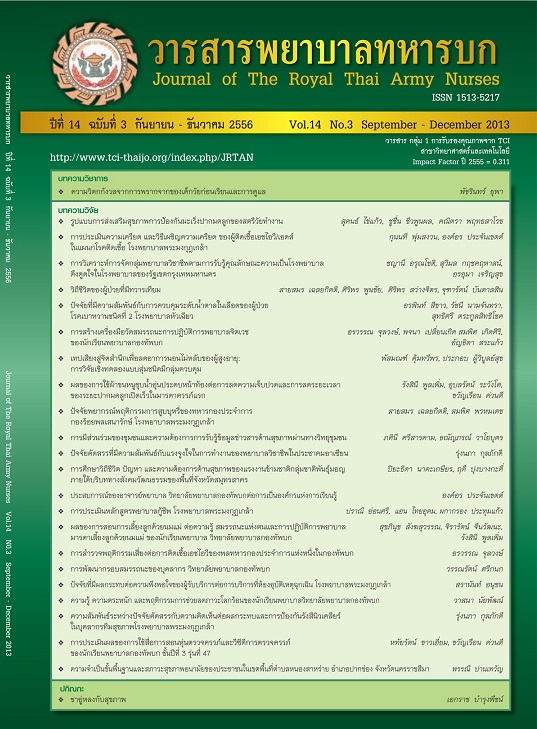การประเมินความเครียด และวิธีเผชิญความเครียด ของผู้ติดเชื้อ เอชไอวี/เอดส์ ในแผนกโรคติดเชื้อ โรงพยาบาลพระมงกุฎเกล้า Stress Appraisal and Coping Strategies of HIV/AIDS Infected People in the Infectious Disease Division of Phramongkutklao Hospital
Keywords:
การประเมินความเครียด, วิธีเผชิญความเครียด, ผู้ติดเชื้อเอชไอวี/เอดส์, Stress Appraisal, Coping Strategies, HIV/AIDS infected peopleAbstract
การวิจัยครั้งนี้มีวัตถุประสงค์เพื่อศึกษาระดับความเครียด และวิธีการเผชิญความเครียดของผู้ติดเชื้อเอชไอวี/เอดส์ รูปแบบการวิจัยเป็นการศึกษาวิจัยเชิงสำารวจ กลุ่มตัวอย่าง คือ ผู้ติดเชื้อเอชไอวี/เอดส์ ที่เข้ารับการรักษาแผนกโรคติดเชื้อกองอายุรกรรม โรงพยาบาลพระมงกุฎเกล้า ในช่วงเดือน พฤศจิกายน ถึง มกราคม 2556 จำานวน 246 คน เก็บข้อมูลโดยใช้แบบ
วัดความเครียด และแบบสอบถามวิธีการเผชิญกับความเครียด 7 ด้าน ผลการวิจัยพบว่า กลุ่มตัวอย่างส่วนใหญ่ มีระดับความเครียดมาก คิดเป็นร้อยละ 57.72 รองลงมามีความเครียดเล็กน้อย คิดเป็นร้อยละ 34.55 วิธีการเผชิญความเครียดด้านการแก้ไขปัญหา ใช้วิธีลดหรือขจัดความเครียดโดยพยายามปรับตนเองให้เข้ากับสถานการณ์หรือพยายามปรับเปลี่ยนสถานการณ์ใหม่แบบใช้บ่อย คิดเป็นร้อยละ 55.28 ด้านการยอมรับ ใช้วิธีไม่ทำาอะไรปล่อยให้เป็นเรื่องของโชคชะตา แบบใช้บ้างมากที่สุด คิดเป็นร้อยละ 49.19
ด้านการแสวงหาแหล่งสนับสนุนทางสังคม ใช้ทำาบุญตักบาตร / ทำบุญทางศาสนา ไปวัด ฟังเทศน์สนทนาธรรม / ไปโบสถ์ / ไปสุเหร่าแบบใช้บ่อยมากที่สุด คิดเป็นร้อยละ 44.31 ด้านการหลีกหนี ใช้วิธีลดหรือขจัดความเครียดโดยนอนหลับมากกว่าปกติแบบใช้บ้างมากที่สุด คิดเป็นร้อยละ 59.76 ด้านการต่อต้าน ใช้วิธีพูดคุยเรื่องตลกขบขันหรือแสดงอาการรื่นเริงเพื่อกลบเกลื่อนความไม่สบายใจแบบใช้บ้างมากที่สุด คิดเป็นร้อยละ 48.78 ด้านการเบี่ยงเบนความสนใจ ใช้วิธีทำกิจกรรมต่าง ๆ เช่น อ่านหนังสือฟังเพลง ดูโทรทัศน์ วิดีโอแบบใช้บ้างมากที่สุด คิดเป็นร้อยละ 48.78 ด้านการผ่อนคลายความเครียด ใช้รับประทานอาหารน้อยลง หรือเพิ่มขึ้นแบบใช้บ้างมากที่สุด คิดเป็นร้อยละ 54.88 จากผลการวิจัยชี้ให้เห็นถึงผู้ติดเชื้อเอชไอวี/เอดส์ มีระดับความเครียดมาก เจ้าหน้าที่ทีมสุขภาพจำเป็นต้องให้คำปรึกษารวมทั้งกระตุ้นให้ผู้ติดเชื้อเอชไอวี/เอดส์ เพิ่มความตระหนักรู้ในตนเอง ใช้วิธีการเผชิญปัญหาที่มุ่งแก้ไขปัญหา มองตนเองในแง่บวกมากขึ้น เพื่อช่วยให้จัดการกับความเครียดได้
This research aims to study stress levels and coping strategies of HIV/AIDS people admitted into the Infectious Disease Division of Phramongkutklao Hospital. This exploratory research involved 246 samples who were HIV/AIDS infected people admitted into the division from November to January 2013. Data were collected using the stress test and questionnaire about stress coping strategies. The findings reveal that most of samples had a high stress level, representing 57.72%, followed by a low stress level, 34.55%. Concerning stress coping strategies, the majority of them, accounting for 55.28%, often reduced or eliminated their stress by adapting themselves to the situation or adjusting the situation. In terms of acceptance, the majority of them,
49.19%, sometimes chose not to do anything and left themselves to their luck. Concerning seeking social support, representing 44.31%, often made a food offering to monks/made religious merit, went to the temple to listen to Dhamma teachings/went to church/went to mosque. As for escape, 59.76%, sometimes reduced or eliminated their stress by sleeping more than usual. Regarding resistance, 48.78%, sometimes talked about jokes or pretended to be happy to cover up their unhappiness. As for distraction, most of the samples, 48.78%,
sometimes chose to do activities such as reading, listening to music, and watching television and videos. With regard to stress relaxation, 54.88%, sometimes ate less or more.
These findings pointed out that the HIV/AIDS infected people had high stress levels. Therefore, health staff have to provide them with counseling services; and encourage them to increase their self-awareness, use coping strategies focusing on problem-solving, and look at themselves in a more positive way to assist them in handling their stress.
Downloads
Downloads
How to Cite
Issue
Section
License
บทความหรือข้อคิดเห็นใดใดที่ปรากฏในวารสารพยาบาลทหารบกเป็นวรรณกรรมของผู้เขียน ซึ่งบรรณาธิการหรือสมาคมพยาบาลทหารบก ไม่จำเป็นต้องเห็นด้วย
บทความที่ได้รับการตีพิมพ์เป็นลิขสิทธิ์ของวารสารพยาบาลทหารบก
The ideas and opinions expressed in the Journal of The Royal Thai Army Nurses are those of the authors and not necessarily those
of the editor or Royal Thai Army Nurses Association.






